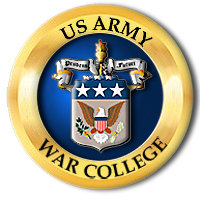David Huntoon Named U.S. War College Course Strategic Instructor
 A revised U.S. Army War College leadership development program for brigadier generals attempts to improve communication skills as well as expand understanding of the Army’s role in the bigger national security picture. The pilot course, run in March at Carlisle Barracks, Pennsylvania, proved the concept has enough value for a second course to be held in fiscal year 2015 before a final decision is made about incorporating the program into the Army Strategic Leadership Development Program.
A revised U.S. Army War College leadership development program for brigadier generals attempts to improve communication skills as well as expand understanding of the Army’s role in the bigger national security picture. The pilot course, run in March at Carlisle Barracks, Pennsylvania, proved the concept has enough value for a second course to be held in fiscal year 2015 before a final decision is made about incorporating the program into the Army Strategic Leadership Development Program.
Known as Senior Leader Seminar Phase II and hosted by the college’s Center for Strategic Leadership and Development (CSLD), the four-week program is a follow-on to the existing one-week leadership seminar for senior colonels, GS-15s or the equivalent, and for command and staff sergeants major who are assigned as advisors or staff officers for senior general officers and senior executive service civilians. The Phase II course is designed for promotable colonels and brigadier generals to develop positive leader attributes and core leadership competency so they can serve in higher national posts. Real-life experience is provided to develop their skills.
The pilot program, conducted March 2-28, had just seven officers in the class-three colonels and four brigadier generals-a size aimed at providing an intimate educational environment. In this case, the selected leaders were young general officers or soon-to-be general officers with potential to serve in critical strategic assignments at the national level.
To that end, the course provided a learning experience focused on thinking, leading and communicating. A number of themes were addressed, for example: understanding the Army’s role in national security, demonstrating strategic leadership, understanding the principles of strategic communication, exercising strategic communication in writing and speaking publicly on issues of strategic landpower.
Each week focused on a specific theme, with graded course work by the students and a Resilience and Self-Awareness (RSA) analysis. This analysis was conducted by Dr. Tom Williams and his RSA team of professionals. They are a unique U.S. Army War College asset that optimizes individual leader attributes, both physical and behavioral, through the use of sophisticated analysis tools. This analysis combines executive fitness instruction with personality and leadership evaluations designed to help each officer be more self-aware and to help identify areas where they can adapt their strategic leadership and management styles to improve their effectiveness.
A final objective of the pilot course was to determine its potential value to the Army, identify potential modifications for future courses and develop a recommendation for the Chief of Staff of the Army (CSA) regarding a way ahead for the course.
Adult Education Model
The course employed an adult education model to achieve its goals, offering 32 keynote presentations, historic vignette case studies and panels by a total of 40 subject-matter experts followed by extended question-and-answer periods. After most of these plenary sessions, the students participated in a dialogue, facilitated by a retired four-star general and with two retired three-star general officers serving as strategic coaches.
Retired Army Gen. john Abizaid and retired Air Force Gen. Michael P.C. Carns served as the strategic facilitators for the pilot course. In addition to helping establish relevance and expand upon points made by course speakers, they also provided their unique insight into the role, mindset and attributes of a four-star strategic leader. Both generals were satisfied with the course and felt it met the CSA’s overall objective.
Lessons leveraged periods of diverse high-level thought, discussion and performance. Through actual engagement with defense industry experts, Congress, think tanks, universities, media members, noted scholars, national security practitioners and other strategic actors, rigor, realism and professional risk were incorporated into the course. The national leaders who addressed the group shared their personal insights and views on a wide range of topics. The experts provided guidance about the high-visibility, high expectation world of strategic leadership.
The course required publication of an op-ed piece, a personal meeting with a member of Congress, a media interview, and external engagements with think tanks and academic audiences. The course concluded with an oral defense of the student’s op-ed topic to a board of distinguished general officers and academics. The topics included sexual assault and the prevailing debate on a commander’s authority, several pieces on how the Army must adapt to retain its best talent as it draws down the force, an updated strategic approach for employment of U.S. landpower in the Pacific, and a new approach to force management as the Army addresses the balance between force size and strategic missions.
The course also provided formal feedback on students’ progress by the strategic coaches, retired Lt. Gens. David Huntoon and William Troy. Both are former directors of the Army Staff and noted strategic practitioners with both Army and joint command and staff experience. Their unique blend of academic and practical strategic service at the highest levels of the defense enterprise uniquely qualified these officers to mentor the students throughout the course. The coaches also evaluated the students’ participation, understanding of the strategic issues, and oral and written work.
The pilot course demonstrated that the program is a viable and cost-effective way to meet the developmental needs of the Army’s brigadier generals, and it has great potential to enhance the Army’s future strategic leaders. The students appreciated the opportunity the Army provided them to be better strategic leaders, and everyone involved in the course gave it positive reviews. All were united in their support for continuing the course and using it to contribute to the CSA’s ability to develop strategic leaders to lead the Army into the future.
Course Speakers
The list of luminaries who addressed Senior Leader Seminar Phase IT included:
- Gen. John R. Allen, U.S. Marine Corps retired
- Gen. Daniel B. Allyn, commanding general, U.S. Army Forces Command
- Gen. Lloyd J. Austin III, commanding general, U.S. Central Command
- Jeremy B. Bash, former Chief of Staff to the Secretary of Defense
- Lt. Gen. Thomas P. Bostick, U.S. Army Chief of Engineers and commanding general, U.S. Army Corps of Engineers
- Gen. Michael P.C. Carns, U.S. Air Force retired
- Gen. James E. Cartwright, U.S. Marine Corps retired
- Christopher M. Chadwick, president and CEO, Boeing Defense, Space & Security
- Hon. Michéle Flournoy, former Under Secretary of Defense for Policy
- Gen. Ronald H. Griffith, U.S. Army retired
- Hon. Henry A. Kissinger, former Secretary of State
- Gen. James N. Mattis, U.S. Marine Corps retired
- Gen. Raymond T. Odierno, Army Chief of Staff
- Gen. Gordon R. Sullivan, U.S. Army retired
- Gen. James D. Thurman, U.S. Army retired
- Hon. Thomas E. White, former Secretary of the Army
By Alan G. Bourque
 Alan G. Bourque is an associate professor of strategic leader development in the Center for Strategic Leadership and Development at the U. S. Army War College. During his 30-year U. S. Army career, he led and managed staffs and units at all levels. He holds a bachelor’s degree in history from Wake Forest University and master’s degrees in public administration from the University of Missouri-Kansas City and strategic studies from the U.S. Army War College.
Alan G. Bourque is an associate professor of strategic leader development in the Center for Strategic Leadership and Development at the U. S. Army War College. During his 30-year U. S. Army career, he led and managed staffs and units at all levels. He holds a bachelor’s degree in history from Wake Forest University and master’s degrees in public administration from the University of Missouri-Kansas City and strategic studies from the U.S. Army War College.
From ARMY Magazine, Vol. 64, No. 8, August 2014. Copyright 2014 by the Association of the U.S. Army and reprinted by permission of ARMY Magazine.